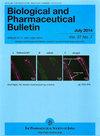Monocarboxylate Transporters 1 and 2 Are Responsible for L-Lactate Uptake in Differentiated Human Neuroblastoma SH-SY5Y Cells.
IF 1.7
4区 医学
Q3 PHARMACOLOGY & PHARMACY
引用次数: 0
Abstract
L-Lactate transport via monocarboxylate transporters (MCTs) in the central nervous system, represented by the astrocyte-neuron lactate shuttle (ANLS), is crucial for the maintenance of brain functions, including memory formation. Previously, we have reported that MCT1 contributes to L-lactate transport in normal human astrocytes. Therefore, in this study, we aimed to identify transporters that contribute to L-lactate transport in human neurons. SH-SY5Y cells, which are used as a model for human neurons, were differentiated using all-trans-retinoic acid. L-Lactate uptake was measured using radiolabeled L-lactate, and the expression of MCT proteins was confirmed Western blotting. L-Lactate transport was pH-dependent and saturated at high concentrations. Kinetic analysis suggested that L-lactate uptake was biphasic. Furthermore, MCT1, 2 selective inhibitors inhibited L-lactate transport. In addition, the expression of MCT1 and 2 proteins, but not MCT4, was confirmed. In this study, we demonstrated that MCT1 and 2 are major contributors to L-lactate transport in differentiated human neuroblastoma SH-SY5Y cells from the viewpoint of kinetic analysis. These results lead to a better understanding of ANLS in humans, and further exploration of the factors that can promote MCT1 and 2 functions is required.单羧酸盐转运体 1 和 2 在分化的人神经母细胞瘤 SH-SY5Y 细胞中负责摄取 L-乳酸。
中枢神经系统中通过单羧酸盐转运体(MCT)进行的 L-乳酸盐转运(以星形胶质细胞-神经元乳酸盐穿梭器(ANLS)为代表)对维持大脑功能(包括记忆的形成)至关重要。此前,我们曾报道 MCT1 在正常人的星形胶质细胞中有助于 L 型乳酸的转运。因此,在本研究中,我们的目的是鉴定有助于人类神经元中 L-乳酸盐转运的转运体。作为人类神经元模型的 SH-SY5Y 细胞使用全反式维甲酸进行分化。使用放射性标记的 L-乳酸测量了 L-乳酸的摄取量,并通过 Western 印迹证实了 MCT 蛋白的表达。L-乳酸盐的转运依赖于 pH 值,在高浓度时达到饱和。动力学分析表明,L-乳酸盐的吸收是双相的。此外,MCT1、2 选择性抑制剂可抑制 L-乳酸盐转运。此外,还证实了 MCT1 和 2 蛋白的表达,而不是 MCT4 蛋白的表达。在这项研究中,我们从动力学分析的角度证明了 MCT1 和 2 是分化的人神经母细胞瘤 SH-SY5Y 细胞中 L-乳酸转运的主要贡献者。这些结果有助于更好地理解人类的 ANLS,而促进 MCT1 和 2 功能的因素还需要进一步探索。
本文章由计算机程序翻译,如有差异,请以英文原文为准。
求助全文
约1分钟内获得全文
求助全文
来源期刊
CiteScore
3.50
自引率
5.00%
发文量
247
审稿时长
2 months
期刊介绍:
Biological and Pharmaceutical Bulletin (Biol. Pharm. Bull.) began publication in 1978 as the Journal of Pharmacobio-Dynamics. It covers various biological topics in the pharmaceutical and health sciences. A fourth Society journal, the Journal of Health Science, was merged with Biol. Pharm. Bull. in 2012.
The main aim of the Society’s journals is to advance the pharmaceutical sciences with research reports, information exchange, and high-quality discussion. The average review time for articles submitted to the journals is around one month for first decision. The complete texts of all of the Society’s journals can be freely accessed through J-STAGE. The Society’s editorial committee hopes that the content of its journals will be useful to your research, and also invites you to submit your own work to the journals.

 求助内容:
求助内容: 应助结果提醒方式:
应助结果提醒方式:


